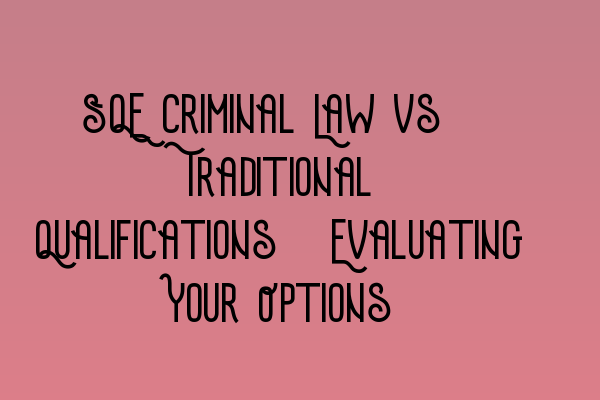SQE Criminal Law vs. Traditional Qualifications: Evaluating Your Options
Aspiring solicitors looking to practice criminal law in the UK often face a significant decision: whether to pursue the newly introduced Solicitors Qualifying Examination (SQE) or opt for traditional qualifications. This blog post aims to guide you through the evaluation process, considering the pros and cons of both options, helping you make an informed choice for your legal career.
Understanding the SQE and Traditional Qualifications
The Solicitors Qualifying Examination, or SQE, is a new assessment introduced by the Solicitors Regulation Authority (SRA). It replaces the previous system of qualifying as a solicitor in England and Wales. The SQE consists of two stages: SQE1 and SQE2. SQE1 tests candidates on their knowledge of legal principles and procedures, while SQE2 assesses their practical legal skills.
On the other hand, traditional qualifications involve pursuing a qualifying law degree (QLD) or common professional examination (CPE), followed by the Legal Practice Course (LPC) and a period of training contract. This pathway has been the standard route for becoming a solicitor for many years.
Pros and Cons of the SQE
One of the key benefits of the SQE is its flexibility. It allows candidates to choose when and how they study, giving them greater control over their learning experience. Additionally, the SQE offers a more cost-effective approach as compared to traditional qualifications. Candidates can choose specific preparation courses for the different stages of the examination, reducing unnecessary expenses.
However, adapting to the new examination format may pose a challenge for some individuals. The SQE is a computer-based assessment, and while this allows for more efficient grading and results, candidates who prefer paper-based exams may need to adjust to the digital format. Furthermore, as the SQE is relatively new, there may be uncertainties about how employers perceive it initially.
Benefits of Traditional Qualifications
Traditional qualifications have a proven track record of producing successful solicitors. The QLD or CPE, followed by the LPC and training contract, provide a structured pathway, preparing candidates with a comprehensive legal education. This route has long-standing recognition from law firms and legal employers.
Another advantage of traditional qualifications is the established network and support system. Many universities and law schools provide networking opportunities, career guidance, and resources tailored specifically to candidates pursuing traditional pathways. This can be advantageous when seeking employment after qualification.
Considering Your Options
Evaluating your options is crucial before making a decision. Think about your preferred learning style, financial situation, and long-term career goals. Researching law firms’ entry requirements and consulting with industry professionals can offer valuable insights. Additionally, taking advantage of resources such as practice exams and preparation courses, like SQE 1 Practice Exam Questions and SQE 1 Practice Mocks FLK1 FLK2, can help you gauge your readiness for the SQE.
If you decide to pursue the SQE, exploring SQE 2 Preparation Courses and SQE 1 Preparation Courses can be valuable in enhancing your knowledge and skills. It is also essential to keep track of SRA SQE Exam Dates to plan your preparation effectively and ensure timely registration for the exams.
Conclusion
Ultimately, the choice between the SQE and traditional qualifications depends on your personal circumstances and preferences. Both pathways have their merits and limitations. Careful consideration, research, and utilizing relevant resources will empower you to make an informed decision. Remember, the legal profession is ever-evolving, and embracing changes can lead to exciting opportunities and career growth.
